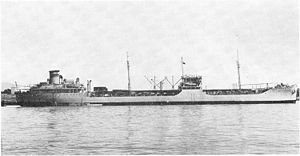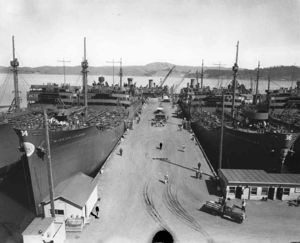Mission Buenaventura-class oiler
Jump to navigation
Jump to search
 USNS Mission Buenaventura prepares to USNS Mission Buenaventura prepares toget underway, date and location unkown.[1] | |
| History | |
|---|---|
| Preceded by: | Cimmeron-class |
| Built: | between 1943–1945 |
| Planned: | 29 |
| Completed: | 27 |
| In commission: | between 1944–1980 |
| Succeeded by: | Suamico-class |
| General Characteristics | |
| Hull type: | T2-SE-A2 |
| Displacement: | 5,532 tons light; 21,880 tons full |
| Length: | 524 ft (160 m) |
| Beam: | 68 ft (24 m) |
| Draft: | 30 ft (9.0 m) |
| Speed: | 16.5 kt (31 km/h) |
| Complement: | 52 |
| Propulsion: | Turbo-electric, single screw, 6,000 hp |
| Armament (as-built): | None |
The Mission Buenaventura-class was a series of twenty-seven T2 tankers built during World War II by Marinship of Sausalito, California under contract to the United States Maritime Commission for use by the United States Navy as fleet oilers. Two additional vessels were converted to distilling ships in 1944, after their keels were laid. All ships in the class were named after Spanish colonial settlements located in the present-day state of California save for USNS Mission Loreto which was named for a settlement in Baja California Sur, Mexico.
List of vessels
- USNS Mission Buenaventura (T-AO-111)
- USNS Mission Capistrano (T-AO-112)
- USNS Mission Carmel (T-AO-113)
- USNS Mission De Pala (T-AO-114)
- USNS Mission Dolores (T-AO-115)
- USNS Mission Loreto (T-AO-116)
- USNS Mission Los Angeles (T-AO-117)
- USNS Mission Purisima (T-AO-118)
- USNS Mission San Antonio (T-AO-119)
- USNS Mission San Carlos (T-AO-120)
- USNS Mission San Diego (T-AO-121)
- USNS Mission San Fernando (T-AO-122)
- USNS Mission San Francisco (T-AO-123)
- USNS Mission San Gabriel (T-AO-124)
- USNS Mission San Jose (T-AO-125)
- USNS Mission San Juan (T-AO-126)
- USNS Mission San Luis Obispo (T-AO-127)
- USNS Mission San Luis Rey (T-AO-128)
- USNS Mission San Miguel (T-AO-129)
- USNS Mission San Rafael (T-AO-130)
- USNS Mission Santa Barbara (T-AO-131)
- USNS Mission Santa Clara (T-AO-132)
- USNS Mission Santa Cruz (T-AO-133)
- USNS Mission Santa Ynez (T-AO-134)
- USNS Mission Solano (T-AO-135)
- USNS Mission Soledad (T-AO-136)
- USNS Mission Santa Ana (T-AO-137)
Notes
- ↑ (PD) Photo: United States Navy
